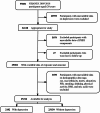Association of planetary health diet index with depression and mortality in the United States
- PMID: 40448075
- PMCID: PMC12125849
- DOI: 10.1186/s12888-025-06987-x
Association of planetary health diet index with depression and mortality in the United States
Abstract
Background: Given the changes in global environmental conditions and dietary patterns, understanding the potential impact of dietary factors on the risk of depression is crucial. The Planetary Health Diet Index (PHDI) is a dietary scoring system that integrates human health and environmental sustainability. This study aims to evaluate the association between the PHDI, the risk of depression, and mortality.
Methods: Data from the National Health and Nutrition Examination Survey 2005-2018. Depression was assessed using Patient Health Questionnaire-9 (PHQ-9), with a score ≥ 10 indicating depression. PHDI calculated from 14 self-reported dietary groups, ranges from 0 to 140. Multivariable weight logistic and linear regression explored the association of PHDI with depression and total PHQ-9 score. Cox proportional hazards regression examined PHDI associations with mortality. Additional analyses included restricted cubic spline (RCS), threshold analyses, subgroup analyses, and multiple imputation.
Results: Adjusting for confounding variables, each 10-point increase in PHDI was associated with an 11% lower risk of depression (OR = 0.89, 95% CI = 0.84, 0.94), 0.13 score of total PHQ (β=-0.13, 95% CI=-0.18, -0.08), and 17% of all-cause mortality (HR = 0.83, 95% CI = 0.73, 0.95). RCS indicated an inverse L-shaped association between PHDI and depression, and threshold effects analyses showed that the above associations were more significant in those with PHDI ≥ 76.01.
Conclusions: Adherence to the PHDI dietary pattern is associated with a reduced risk of both depression and all-cause mortality. PHDI may provide dietary guidance for the early prevention and intervention of depression.
Keywords: Depression; Mortality; NHANES; PHDI.
© 2025. The Author(s).
Conflict of interest statement
Declarations. Ethics approval and consent to participate: NHANES is carried out by the Centers for Disease Control and Prevention (CDC) in collaboration with the National Center for Health Statistics (NCHS). The NHANES study protocol underwent review and approval by the NCHS Research Ethics Review Committee. Written informed consent was obtained from all participants. Consent for publication: Not applicable. Competing interests: The authors declare no competing interests.
Figures


Similar articles
-
Associations of the planetary health diet index (PHDI) with asthma: the mediating role of body mass index.BMC Public Health. 2024 Aug 26;24(1):2305. doi: 10.1186/s12889-024-19856-1. BMC Public Health. 2024. PMID: 39187832 Free PMC article.
-
Planetary health diet index and mortality among US cancer survivors: mediating roles of systemic immune-inflammation index and neutrophil-to-lymphocyte ratio.Nutr J. 2025 Feb 22;24(1):28. doi: 10.1186/s12937-025-01097-6. Nutr J. 2025. PMID: 39987440 Free PMC article.
-
From planetary health diet (PHD) to mental health: Higher PHD index protects against depression among the U.S. population.J Psychiatr Res. 2025 Mar;183:31-38. doi: 10.1016/j.jpsychires.2025.02.006. Epub 2025 Feb 5. J Psychiatr Res. 2025. PMID: 39923355
-
Association between the Planetary Health Diet Index and biological aging among the U.S. population.Front Public Health. 2024 Oct 22;12:1482959. doi: 10.3389/fpubh.2024.1482959. eCollection 2024. Front Public Health. 2024. PMID: 39502823 Free PMC article.
-
Health and environmental dietary impact: Planetary health diet vs. Mediterranean diet. A nationwide cohort in Spain.Sci Total Environ. 2025 Mar 10;968:178924. doi: 10.1016/j.scitotenv.2025.178924. Epub 2025 Feb 22. Sci Total Environ. 2025. PMID: 39987831 Review.
References
-
- GBD 2021 Diseases and Injuries Collaborators. Global incidence, prevalence, years lived with disability (YLDs), disability-adjusted life-years (DALYs), and healthy life expectancy (HALE) for 371 diseases and injuries in 204 countries and territories and 811 subnational locations, 1990–2021: a systematic analysis for the global burden of disease study 2021. Lancet. 2024;403:2133–61. - PMC - PubMed
-
- Swainson J, Reeson M, Malik U, Stefanuk I, Cummins M, Sivapalan S. Diet and depression: A systematic review of whole dietary interventions as treatment in patients with depression. J Affect Disord. 2023;327:270–8. - PubMed
MeSH terms
Grants and funding
- 2024, SCYW25-72/Research Projects of the Sichuan Provincial Association for Medical Administration
- 2024, SCYW25-72/Research Projects of the Sichuan Provincial Association for Medical Administration
- 2023480/Chengdu University Institutional Reform Project
- 2023480/Chengdu University Institutional Reform Project
LinkOut - more resources
Full Text Sources
Medical

